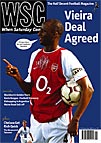 A well written, well presented and witty US website on football is neither a contradiction in terms nor something dedicated to fat men in pads and helmets, Ian Plenderleith avers in this month’s review
A well written, well presented and witty US website on football is neither a contradiction in terms nor something dedicated to fat men in pads and helmets, Ian Plenderleith avers in this month’s review
There has rarely been an online fanzine as densely but superbly presented as The Global Game, the monthly brainchild of Georgia-based American journalist John Turnbull. Available in browser or Adobe Acrobat format, the four-page journal combines excellent writing and anecdotal wit to present new angles on the game, and thoroughly researched links to places you would never otherwise find.
Issue six (issue seven, a Women’s World Cup special, was due out mid-August) covers the distractions of playing youth football while Zeppelins hover overhead, a revealing story from a writer on the Atlanta Journal-Constitution about his struggle to have the word “football” properly used in a US paper (“No, you mean NFL. That’s not football. Please, that’s something else. That’s a travesty.”) and an analysis of the tension between the women’s and men’s game with reference to philosopher Hannah Arendt and The Journal of Nordic Women’s Studies.
The site’s main page features “Updated Media Gleanings”, an ongoing round-up of some of the more obscure stories around the world and where to find them. You might find, for example, a number of links on the Homeless World Cup in Graz, or Australian newspaper commentaries on the latest FIFA shenanigans regarding that elusive Oceania World Cup qualifying spot.
From The Global Game you can link to OmniBall, claiming to be the world’s first interactive football encyclopaedia, with over 20,000 entries in English and Spanish arranged according to players, clubs, coaches and stadiums, with a rather flat anecdotes section.
As a reference tool for the lazy it has a possibly huge future when it broadens its scope and elaborates on detail, but its database is still too sporadic, sparse and – in terms of its Devil’s Dictionary-like potential – prosaic to be of much use or entertainment value as yet. It’s a space worth watching, however, and if there are clubs, players or stadiums that are missing, you can make your own “definition”.
For background on stadiums, say, you’d be better served by Eurostadiums, yet another titillating compendium of stands, stats and floodlights of all dimensions that may cause you to quit your job and become a trans-European groundhopper (regular WSC readers with a sideline in psychology will have long since sussed that my frequent asides against serial stadium travellers are merely a mask for my own thwarted desires to spend my entire life watching crap football in obscure places).
Look at the chestnut trees dwarfing the fans of Plauen in Germany. Marvel at the see-though green dugouts at Gradski Stadium, home to the Bulgarian side Litex Lovich. Ask whether it’s coincidence that everyone at Odessa Chernomeret’s Black Sea Steamship Stadium in Ukraine seems to be wearing black. Click on Finland and ponder the mystery of two adjacent stands at Tampere United apparently facing in different directions, or gasp at the rainbows over Rovaniemi. Go on, you know you want to.
Finally this month, It’s Up For Grabs Now is a site aiming to reawaken ITV’s interest in its regional football archive by chronicling the history of football on the independent regional channels from the early 1960s, when Anglia TV bought the rights for 30 league games for £1,000, through to the 1980s, when regionalised coverage gradually receded. Site founder John Bourn also intends it to be used both for reference and nostalgia purposes, and it represents a notable expansion of a piece he wrote for WSC last year (see issue 188).
Bourn recounts the quirks of commentators from a different era, such as STV’s Arthur Montford, who “would become famous for his turns of phrase (‘what a stramash!’), violently checked sports jackets and support for lowly Morton (‘Today’s big game was the Glasgow derby but we sent our cameras to Cappielow for Morton’s local derby with Dumbarton’).”
On a personal note, reading the section on Yorkshire TV brought back torrid memories of Martin Tyler’s debut in the 1970s when his somewhat camped-up approach (“Oooh I say, that was a hard shot,” or something similar) enraged the sexual sensibilities of my Dad. Only when he was replaced by the weedy tones of John Helm did we realise what we’d lost, and even he was usurped on the bad-jumpered ineptitude front by the stumbling Derek Dougan, painfully poor presenter of The Big Game in the early 1980s.
If you’re burning to find out where your Sunday afternoon televisual companions of yore are hanging out now (or are buried), this is the place to look.
From WSC 199 September 2003. What was happening this month